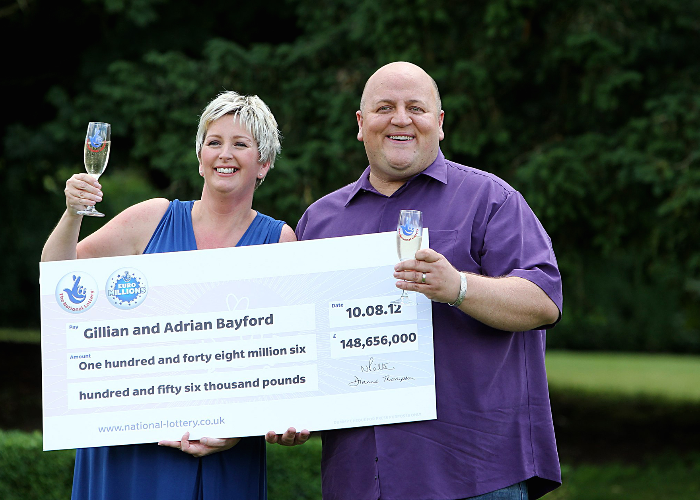Lottery email scam: fake cash donation award 'from Gillian and Adrian Bayford'

Scammers are impersonating genuine lottery jackpot winners Gillian and Adrian Bayford in a bid to lure people into sharing their personal details with a 'cash donation' email scam.
It’s not uncommon to daydream about winning the lottery, so it can be tempting when you receive a surprise email from famous lottery winners offering you a cash donation.
But this is sadly fraudsters trying to con you into giving them personal and financial details so they can steal your hard-earned cash.
One of the latest scams doing the rounds involves criminals impersonating legitimate lottery winners Gillian and Adrian Bayford, who won £148 million in 2012.
We’ll reveal how the scam works, red flags and what you should do to stay safe.
Clone firm investment scams: how they work & how to stay safe
Cash donation email lottery scam
We recently received an email supposedly from ‘Gillian and Adrian Bayford,’ which states they are offering a cash donation of £1.5 million to ‘five lucky individuals and 10 charity organisations.’
It claims that all you need to do is reply to the Gmail email address – which anyone can set up free of charge (and should be a red flag).
According to Action Fraud, lottery scams usually involve fraudsters imitating genuine lotteries, but in this case, they are pretending to be actual lottery winners.
You’ll be asked for personal information and copies of official documents, including your passport, so the fraudsters can steal your identity.
Then the fraudster will claim you’ll have to pay a fee, which could range from taxes to banking fees so they can give you the money.
With traditional lottery scams, these fees would be needed to ‘release’ your winnings.
Sadly, once you’ve made a payment, the scammers are likely to demand more and will make up excuses to not send the money. They may even ask for your bank details so they can send the money directly to you.
But Action Fraud warns they’ll use your bank details to empty your account.
We've pasted the full, unedited text of the scam email text we received below, but please note that scammers may well send out different versions.
Subject: FW: CASH DONATION AWARD 1,500,000.00 GBP
Body: We are Gillian and Adrian Bayford. My wife and I won the biggest Euro Millions lottery prize of £148 Million GBP and we just commenced our Charity Donation and we will be giving out a cash donation of £1,500,000.00 GBP GBP to 5 lucky individuals and 10 charity organizations from any part of the world. Reply to adriangillian982020@gmail.com
HMRC tax evasion scam: how it works, red flags & more

How to avoid UK lottery scams
While traditional lottery scams work by claiming you've won a jackpot, this scam takes a slightly different approach by claiming to be winners themselves who are offering to share their funds.
The fact the email mentions legitimate lottery winners does give it some credibility, but it's still really easy to spot it's a scam.
To start with, check the actual sender's address.
Does it match the sender's name, even remotely? In the example we received, the sender was <510@ntech-s.ru>, which would be a rather unusual email address for the Bayfords to be using.
The fact they then ask you to send your response to a completely different email address is a sign this has been sent from a hijacked account.
Also, check the spelling and grammar, as fake emails are far more likely to contain errors than legitimate communications. If you look at the text above there are a few mistakes that stand out, such as the American spelling of the word 'organization'.
If you do receive any emails allegedly from lottery winners or about winning money (and you haven’t entered anything), definitely don’t respond to it or click on any links.
Action Fraud warns that any request for a fee payment is a sure sign that someone is trying to defraud you – so it’s vital you don’t disclose any bank details.
Another red flag is being asked to keep any money offered a secret, particularly as genuine giveaways tend to be highly publicised.
If you’ve unfortunately fallen for this scam, report it to Action Fraud immediately and cut off all contact with the scammers.
If you’ve given any bank details or money to the fraudsters, notify your bank as soon as possible.
Also, check out our guide on how to get your money back after getting scammed.
Sadly, you’re likely to be targeted by other fraudsters if you’ve fallen for a scam, so don’t trust any communication out of the blue – even if someone claims they can get your money back.
Sometimes scammers will pose as your bank, the police or lawyers and offer help – but charge a fee for their services.
Are you struggling to get a refund after being scammed? Our consumer champion may be able to help resolve your issue or put you in contact with the right people. Contact us at uknews@lovemoney.com.
Want more stories like this? Head over to the loveMONEY homepage, follow us on Twitter or Facebook or sign up for our newsletter and let us send the news to you!
Comments
Be the first to comment
Do you want to comment on this article? You need to be signed in for this feature